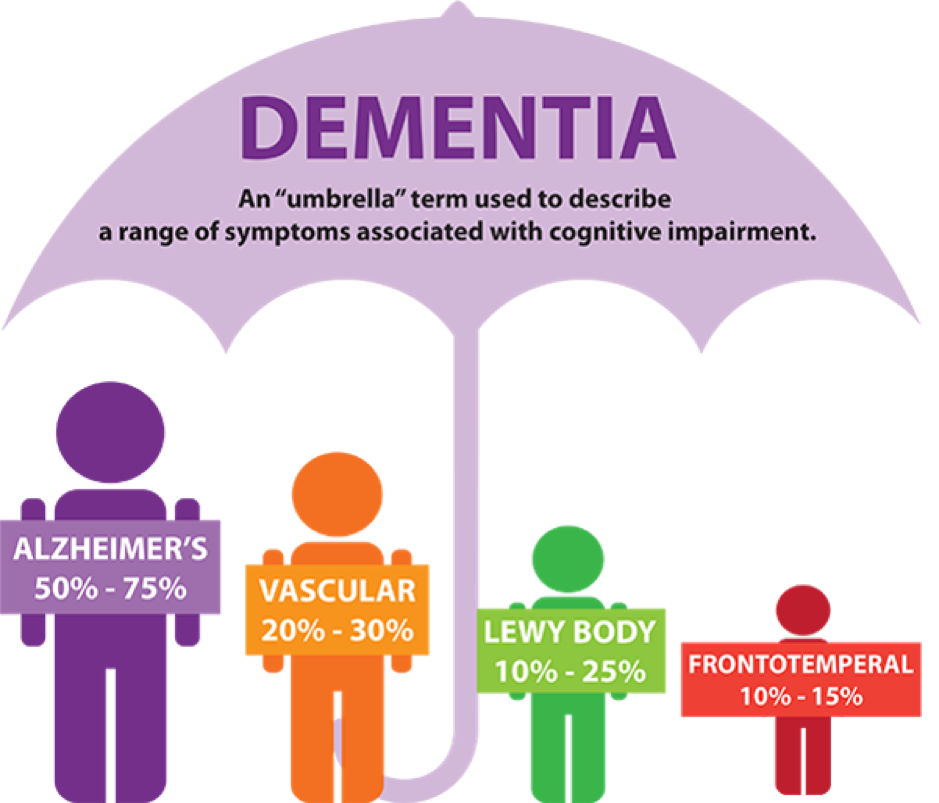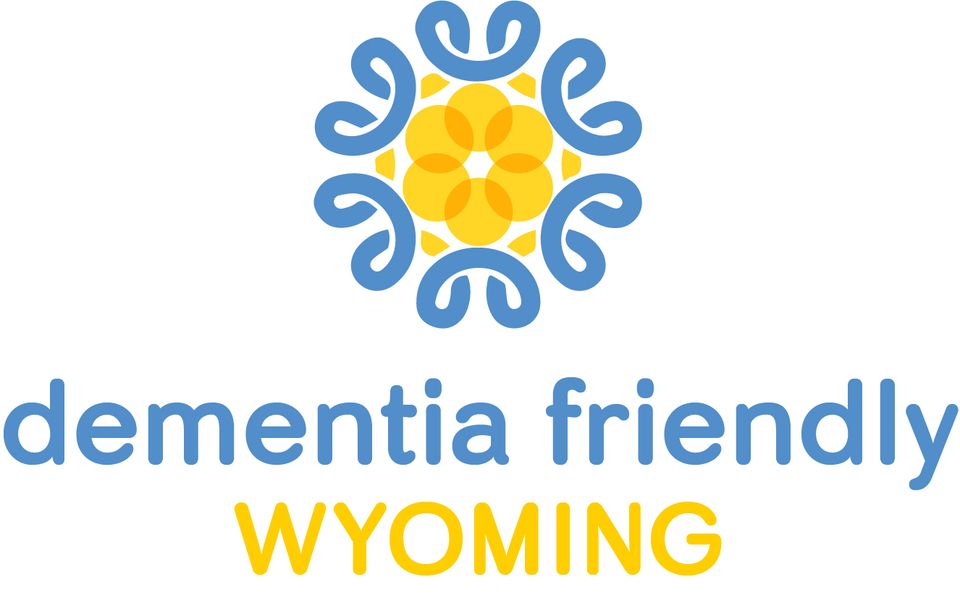Types of Dementia
Dementia is a broad umbrella term used to describe a range of progressive neurological disorders. There are many different types of dementia and some people may present with a combination of types. Regardless of which type is diagnosed, each person will experience their dementia in their own unique way.

Here are the four most prevalent forms of dementia.
Alzheimer’s Disease
Alzheimer’s disease is by far the most well-known and common type of dementia.
Common symptoms:
- Memory loss
- Confusion
- Difficulty communicating
- Anxiousness
- Paranoia
Cause: The mechanisms behind Alzheimer’s disease aren’t well understood and there are competing hypothesis, but the most distinguishing feature of Alzheimer’s disease is the buildup of amyloid plaques and tau tangles in the brain. It’s widely believed that these brain changes are behind the disease.
Treatments or therapies: There are many therapies, both pharmaceutical and non-chemical which can temporarily increase functioning and improve the spirits of the person with Alzheimer’s disease, but no treatment has proven to be effective. The Alzheimer’s Association says, “At this time there is no treatment to cure, delay or stop the progression of Alzheimer’s disease.”
The U.S. government has made Alzheimer’s research a high priority and set the optimistic goal of finding a cure by 2025. Vigorous research continues and numerous possible treatments are being investigated.
More About Alzheimer’s
- National Institute on Aging
- Alzheimer’s Association
- Alzheimers.gov
- Alzheimer’s Foundation of America
Alzheimer’s Care Partners
Alzheimer’s Online Support Groups and Forums & Facebook
- Alzheimer’s Association – Caregiver Discussion Board
- Alzheimer’s and Dementia Caregivers Group – Facebook
- AgingCare.com – Alzheimer’s & Dementia Q&A
Vascular Dementia
Vascular dementia is also known as “multi-infarct dementia” or “post-stroke dementia” and is the second most common cause of dementia.
Main symptoms:
- Memory loss
- Impaired judgment
- Decrease ability to plan
- Loss of motivation
Cause: Bleeding within the brain from a stroke cause brain damage.
Treatments or therapies: Vascular dementia cannot be cured, but people who have the ailment are treated to prevent further brain injury from the underlying cause of the ailment. Like Alzheimer’s disease, numerous medication and therapies may be used to help manage the symptoms.
More About Vascular Dementia
- Alzheimer’s Association
- UCSF – Memory & Aging
- National Stroke Association
- Fightdementia.org
- Dementia Care Central
Vascular Dementia Care Partners
Vascular Online Support Groups and Forums & Facebook
- Alzheimer’s Association – Caregiver Discussion Board
- Vascular Dementia – Facebook Group
- Tips for Vascular, Alzheimer’s & Mixed Dementia, Support and Information – Facebook Group
Lewy Body Dementia
Lewy body dementia is the third most common cause of dementia, and is also called “cortical Lewy body disease” or “diffuse Lewy body disease.”
Main symptoms:
- Sleep problems
- Memory loss
- Hallucinations
- Frequent swings in alertness
Cause: Lewy bodies abnormal proteins that somehow appear in nerve cells and impair functioning.
Treatments or therapies: There is no known treatment to reverse Lewy body dementia or address its underlying cellular cause, but as with Alzheimer’s and other the other main types of dementia, a wide array of therapies and treatment are used to improve the patient’s quality of live and alleviate symptoms.
More About Lewy Body Dementia
- Lewy Body Dementia Association
- Alzheimer’s Association
- National Institute on Aging
- Healthline
- Family Caregiver Alliance
- University of Nottingham
Lewy Body Care Partners
- Lewy Body Association – Caregiving Topics
- National Institute on Aging
- Lewy Body Association – Caregiving FAQ
- BioMed Central
Lewy Body Online Support Groups and Forums & Facebook
- Lewy Body Association Online Forum
- Lewy Body Dementia, Caring Spouses – Yahoo Group
- Forget Me Not – Lewy Body Dementia – Facebook Group
- Lewy Body Dementia – Facebook Page
Frontotemporal Dementia
Frontotemporal dementia is fairly rare, but believed to be the fourth most common type of dementia. Unlike the types of dementia discussed previously, frontotemporal dementia is marked more by behavioral and emotional changes than by cognitive impairment. In fact, memory is preserved in people with frontotemporal dementia.
Main symptoms:
- Decreased inhibition (frequently leading to inappropriate behavior)
- Apathy and loss of motivation
- Decreased empathy
- Repetitive of compulsive behaviors
- Anxiety and depression
Cause: Frontotemporal dementia occurs when the frontal or temporal lobes of the brain are damaged or shrink.
Treatments or therapies: Frontotemporal dementia cannot be cured or reversed, but doctors will use medicines to treat uncomfortable or problematic symptoms.
More About Frontotemporal Dementia
- The Association for Frontotemporal Degeneration
- Alzheimer’s Association
- DementiaToday
- UCSF – Memory & Aging
- The Bluefield Project
- Family Caregiver Alliance
Frontotemporal Dementia Care Partners
- The Association for Frontotemporal Degeneration – Support for Caregivers
- Alzheimers.net
- Frontotemporal Caregiver Support Center
Frontotemporal Dementia Online Support Groups and Forums & Facebook
- Forget Me Not – Frontotemporal Dementia – Facebook Group
- Frontotemporal Dementia and Caregivers – Facebook Group
Other Causes of Dementia
Just about any condition that causes damage to the brain or nerve cells can cause dementia. For example, people with Parkinson’s disease will often exhibit dementia in the later stages of their illne
